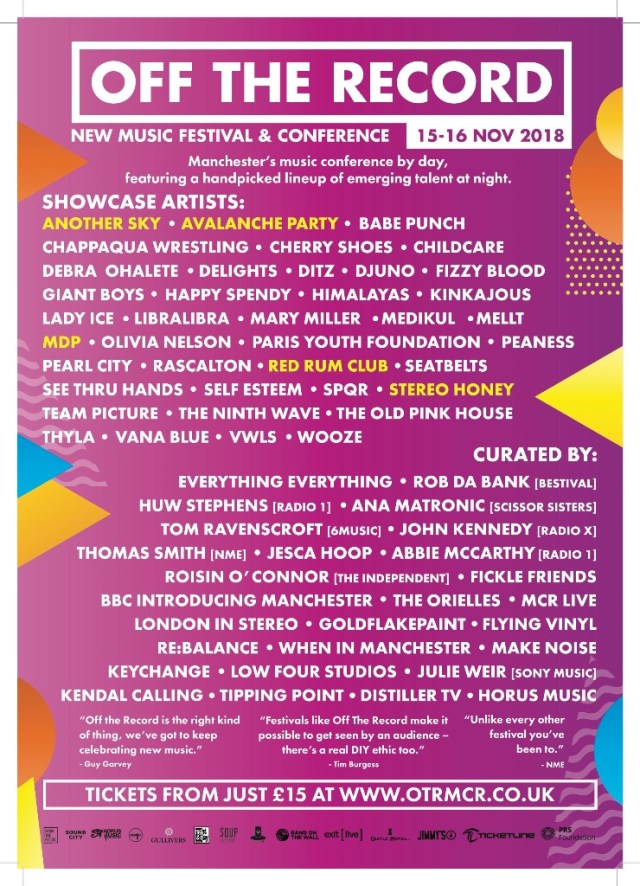When: 15th November 2018
Where: Methodist Central Hall, Manchester, England
Holding a music conference and festival together is increasingly on the agenda for British cities. It adds gravitas to the local scene and can help focus attention on breaking bands and those with as-yet undiscovered potential in both the immediate and wider area.
Manchester’s contribution is Off the Record (OTR), now in its third year and held in the trendy Northern Quarter of the city centre where the majority of small music venues are located in close proximity, from recent start-ups to institutions such as Night & Day and Band on the Wall.
The common link to most of them is the once run-down and quite dangerous Oldham Street, Manchester’s equivalent of Hamburg’s Grosse Freiheit or Amsterdam’s Damrak and the site of the city’s first loft conversion, two years after the huge 1996 IRA bomb. (As this is written, a bland, almost 700-foot tall “aspirational block of new real estate” is being topped out elsewhere in the city).
It is also the location of the single OTR conference venue, the Methodist Central Hall, a budget one befitting the city’s musical heritage far more than say the gleaming Bridgewater Hall or a swanky hotel conference suite would ever do. That’s not to say that this event couldn’t ever be held in the Bridgewater Hall; perhaps one day it might.
For now, OTR’s delegate targeting seems to be directed mainly at bands themselves and at music industry students, of which there were many in attendance, although there was a smattering of managers, publishers, PR people and academics in the audience. I wasn’t aware of many label or A&R folk, or booking agents, although as an early session was at pains to point out they are all still located in the main in London, which after all is a whole two hours away.
Unfortunately I couldn’t stay for the musical part of the event – 40 mainly northern artists and bands across eight venues in one evening – but I hear excellent reports from it and the buzz around the event was that those to watch out for include Another Sky and local rapper Lady Ice in particular.
The event didn’t get off to a great start for me personally. The first session I caught was entitled ‘Northern Revival’. Hosted by well known local DJ and author Dave Haslam, it didn’t appear to have an objective other than to talk around ‘the north-south divide’ and didn’t establish what a ‘northern revival’ is and whether one is actually taking place. They didn’t really nail it.
What it did determine is that even with such diverse distribution platforms nowadays and, as some panellists argued, no real need for a band even to have a manager, the best option open to artists is to develop their own local following as much as possible. Big gigs in London will follow if they have the talent, via online word-of-mouth. Examples such as Blossoms(Stockport), Courteeners (Rochdale) and The Orielles (Halifax) were offered up.
But, you might say, hasn’t that always been the case? And then, almost as if to contradict what had gone before, one panellist ventured that Cabbage’s songs are too highly targeted at ‘local’ working class issues, ones that the people in Shoreditch and Hoxton won’t even understand, and that if they continue in that vein they’ll spend the rest of their career preaching to a small bunch of followers in Mossley. He wasn’t challenged on that view. Writing about similar issues hasn’t held back other Manchester bands in the past, though. Has Britain changed that much since the 1990s? Perhaps it has.
While the panellists insisted this is a golden age for northwest England music and in Manchester in particular (I’m not sure about that), one question wasn’t answered. Why are there so few top-class female single-songwriters here? That particular domain seems to be the preserve of London.
‘Thinking outside the Box – getting creative with gigs’ featured an interesting panel of the founder of Kendal Calling and Bluedot festivals, and the bigger Liverpool Sound City festival and conference; the Bookings Director for the company that runs three venues in Manchester including the Albert Hall; and a Liverpool promoter who has started putting on shows in China.
The 2,200 capacity Albert Hall, and indeed some smaller venues, work 18 months to two years ahead of actual show dates and much of the planning revolves around album release dates. The Bluedot Festival, held at and around the world famous Jodrell Bank radio telescope in Cheshire and which emerged out of one-off shows there by the likes of Sigur Rós and Elbow, was conceived as a concept festival, in the manner of concept albums, and anchored on science and the electronic music that was assumed to be most appropriate to it (for example Jean Michel Jarre headlined the first one, three years ago). The venue itself is seen to be a ‘concept’ one and the suggestion was that there will be more such concept venues/events in the future, as perhaps was the case at the ecologically-themed Eden Project, until Gary Barlow started firing thousand of bits of plastic there out of cannons. That inane act was the equivalent of broadcasting “Fuck Off” out into the universe through Jodrell Bank’s radio telescope.
At the other end of the scale, venues like the 240-capacity Deaf Institute, for which a show each night, every night, is the aim, often sees bands playing to 50 paying customers or less. The stark reality, even for an established and well-known venue like this one, is that five successive nights like that, with fixed staff costs of £600 – £800 each time, means that even if the sixth is a complete sell-out the week’s Profit and Loss account will be in the red.
The arrival of ‘pop-up’ event spaces to combat a perceived lack of and decline in venues and capacity, was debated. This subject intrigues me. We hear much about the loss of venues and capacity but to me there sometimes seems to be too much of it. Many times (including recently) I’ve seen, just like at the Deaf Institute, very thin crowds at Northern Quarter venues in particular, as low as 20 people or less, for highly talented foreign artists who have travelled thousands of miles to perform there. I drew the conclusion that there is simply too much product for the average wallet to sustain. Or, too little knowledge of the foreign artists. Perhaps both.
I tackled one of the panellists (I won’t say which one) for an ‘off the record’ (pardon the pun) chat and he agreed that (a) Manchester is not as ‘international’ as its civic leaders make it out to be and work needs to be done to increase local awareness of visiting foreign artists – you can’t just leave it up to a couple of local booking agencies to do that job. And (b), despite its huge student population – apparently the biggest on one site in the UK and possibly in Europe – they do not habitually go to gigs, rarely to watch cutting-edge indie artists, and only occasionally in support of guitar bands. Live music is no longer at the top of the typical millennial’s “experience wish list”.
‘The New Power Generation’ was a fairly lightweight all-female and jocular discussion which was mainly concerned with what the panellists had done before they entered the business. Again they ranged over what artists need to do to differentiate themselves, and earn a following. A comment that Alan Walker put up a track on YouTube and immediately scored billions of hits so anyone can do it rather overlooked the fact that Walker’s effort was of a quality very rarely achieved in EDM, appealed to a much, much wider audience, and that he employed exactly the right female voice for it. The planets don’t often align in that manner.
‘Getting your music heard – streaming vs. radio’ was a battle between representatives of traditional audio and visual media such as BBC Introducing and online ones such as Spotify and its various playlists. Potentially quicker recognition in the latter case, but potentially more fruitful royalties in the first. The importance of good lead-in times with any new release, and of linking them to live dates, was stressed repeatedly.
How BBC Introducing works was a major part of the debate, creating the impression that young artists may be savvy with new technology but not so much with the older, legacy procedures. Once again the importance of gaining local popularity first and becoming the band in the area was stressed, while the BBC representative also acknowledged that there is a limit for most bands and not many will progress outside their locality. Pragmatism is required.
There was a brief discussion, sponsored by a question from the floor, about algorithmically driven playlists, which had echoes of a debate at the Reeperbahn Festival on the use of artificial intelligence vs. plain gut A&R rationale in determining whether or not a song or artist can be successful (see HERE). It appears that Spotify has them while Apple Music is wholly editorially driven.
Delegates were assured there are many more streaming opportunities abroad and were recommended to seek them out. Pandora in the U.S., still one of the world’s largest, is not one of them however; it is not possible to pitch to Pandora from outside the U.S.
There was a rather strange comment from a panellist that start-up bands don’t need to be on any playlist, but established artists like the Arctic Monkeys do. I’m still trying to figure that one out.
The Methodist Central Hall has a couple of side, breakout rooms and the pleasant Lincoln Room, which has a glorious view out onto Oldham Street, was the location of several afternoon sessions. The first was ‘Managing your Music for TV and Film’, and concerned how to get exposure for a song by having it appear in a TV programme or film, as part of the production or during a credits list, or in a theatre production. Sync music licensing as it is known.
It is a formalised procedure involving a ‘music supervisor’, the traditional title of the responsible person within TV and film companies who is tasked with overseeing this work, which is not as glamorous as it may seem and involves a lot of routine legal procedures.
Where a cover version is concerned it inevitably involves complex negotiation with the master publishing rights holder, which is often a global label.
Examples offered included Gabrielle Aplin’s (cover) version of ‘The Power of Love’ on the 2012 John Lewis Christmas TV advert and Freya Ridings’ ‘Lost Without You’ which has featured on Love Island.
This is my personal favourite, from The Bridge. It could be argued that ‘Hollow Talk’, different parts of which were played during both the opening and closing credits, was a major factor in the massive worldwide success of this programme over four series although Denmark’s Choir of Young Believers do not appear to have benefitted hugely from it and remain largely unknown outside the country.
A great deal of useful information was given as to how to approach TV and film companies and how to configure supporting discs and videos.
This was an especially interesting session for me, as readers of GIITTV’s Nordic Music Scene will discover when the next issue is published in early December. A cover version has just been released of a 1990’s worldwide hit by a Swedish band, a darker take on the original song in tune with the times. Within 24 hours it was picked up in North America for potential use in a forthcoming TV series. But there is a potential master publisher issue.
‘Making money from your music outside the UK’ opened up a Pandora’s Box for aspiring British artists, who were informed that India and China (total population around 2.8 billion) are desperate for their music.
But there are difficulties, of course, such as the lack of Facebook in China, and the need to consider the limitations of working with the officially approved WeChat, which is a more comprehensive and complex social platform than its western equivalents, and Sina Weibo, the equivalent of Twitter.
You have to get on digital service providers (DSPs) or you won’t be heard, and it is more difficult than in the UK. And playing local gigs out there is at least as important as at home, within multi-band collaborations and artist exchanges if necessary (UK artist supports foreign band abroad, and vice versa)
I know from researching Nordic Music Scene that Scandinavian bands frequently head off to Asia rather than Europe, sometimes touring both North and Southeast Asia in one go. Often they are at least partly sponsored financially by extravagant government music export offices. There is not a direct comparison in the UK although the British Council can sometimes help, and the Department for International Trade (DIT), as can the Performing Rights Society (PRS) Fund, Momentum, which offers grants up to £15,000. But for that artists need to be established in the UK first.
PRS website page on recent Momentum grantees: https://prsfoundation.com/projects-weve-funded/our-most-recent-grantees/
Private enterprises include Sofar Sounds and Sonic Bids, which is a paid-for service, as well as the collaborative showcase organisation British Underground.
Other factors to bear in mind include getting a visa in time (and the right visa) – too often critical mistakes are made and artists are turned away at the airport; the cultural mores (be on time for a meeting in Japan or you might as well not show up at all); even the formalities of handing out business cards. The DIT of course has masses of information on this sort of thing.
The final session I attended was lighter in tone and was a head-to-head between Dave Haslam and Bernard Butler, Suede’s original guitarist, rated one of the greatest this country has produced and, well, let’s say a bit of a character. While still performing, he now works in education, where no-one knows who he is or what he did.
Butler should be on everyone’s wish list as an interviewee. Articulate and funny he ranged over the early days of The Smiths (he was influenced by Morrissey and Johnny Marr) and New Order. Referencing earlier discussions about how northern bands can break in London he said that neither of those groups had ever played more than one show at a time in London and for a long time never came anywhere near being the ‘legends’ that they are considered to be now.
There is no such thing as a ‘piece of genius’ song; everything can be improved. In his experience, if there is any such thing as a genius at all, “it is often the weird guy stood in the corner of the room”.
His lyrical style is to base his writing on what is going on in his life. The music can come later.
Butler describes himself as “hacked off” with all the nostalgia in the business right now, and people making money out of it. He worked incognito on over 250 songs by new entrants to the business last year, which gives him far greater pleasure. Neither is he keen on introverts being asked to become extroverts by playing live as the only way to make a living, when it doesn’t suit them. Nor does he care much for “digital tampering” or creating sounds on a ‘phone.
After a fairly slow start this event improved considerably as the day progressed, was well worth the effort of attending, and it should have been invaluable to the band/student delegates in particular.
OTR could continue in a low-key way like this and is almost certain to sell out each year if it does. Or it could adopt greater ambitions and try to replicate the likes of the much larger and more comprehensive Great Escape, Eurosonic and Reeperbahn conference/festivals.
If the latter option is selected it will need to attract some more ‘senior’ speakers. During one session a panellist said she would accept no questions on “Brexit” because she does not read the papers, does not have a clue what is happening and wished it would all just go away. That really isn’t adequate.




